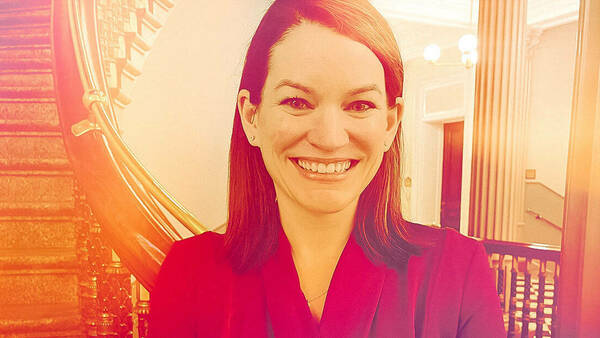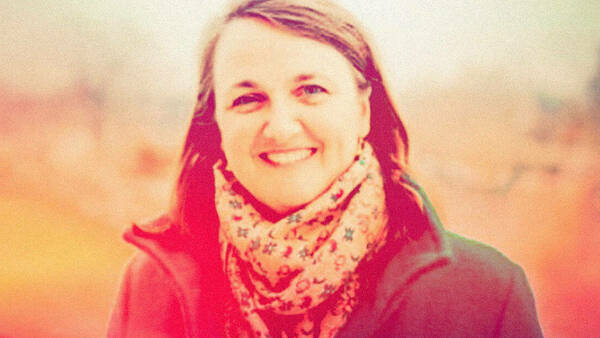Working with under-resourced children and families has brought Emily Rupchock ’20 EMNA a lot of satisfaction over the years, but that wasn’t the only outcome. Her work with these communities brought another beautiful — if unexpected — gift: a daughter.
In developing her career, furthering her education, and growing her family, Rupchock has a habit of staying within her community. When deciding to pursue a master of nonprofit administration degree, the longtime South Bend resident looked no further than Notre Dame. Not only was she able to stay close to home, but Rupchock already had a relationship with the University through her work at local nonprofits.
“Even before I started grad school, I’d had a lot of experiences with the University, whether it be collaborating on research projects or hosting field placements and interns through a number of different schools on campus,” Rupchock says.
Rupchock’s nonprofit work had focused primarily on early childhood. She entered the field as an early childhood teacher at Hope Ministries, but she has since transitioned into leadership roles. Rupchock currently serves as director of Early Learning Partnerships at United Way of St. Joseph County where she collaborates with other organizations to develop programs aimed at helping young children in the community.
For as much as Rupchock’s career was focused on children and their wellbeing, she and her husband, Michael, had difficulty conceiving children of their own. In seeking alternative options for becoming a mom, Rupchock would once again stay local, finding family in the very same underserved communities that she endeavored to support.
Shortly after college, Rupchock worked as an office manager at a foster care agency. As she organized files, she would see when children were moving to different homes or when they were adopted.
Still, Rupchock says, “I saw a lot of names that would stay on our caseload.”
Many of those names belonged to teenagers. Because so many prospective parents want to adopt babies, teenagers often remain in the foster care system until they turn 18.
“I saw teenagers that would age out with very little support. They no longer had birth families, never had an adoptive family, probably had many, many foster homes that they were a part of.”
One teenager Rupchock met at the agency was a 14-year-old named Brit. Her connection with the girl was instant.
“From the minute I met her, she was bright-eyed, kind, and warm,” Rupchock remembers. “She and I are both very deep connectors. If we do connect with people, it’s going to be on a pretty deep level. And there was just a connection right away with her that we both continued to return to.”
Rupchock only worked at the agency for a year, but even after she left and after Brit aged out of the system, they remained in touch, periodically meeting for coffee or shopping trips. Rupchock and Brit remained close for years, but it wasn’t until a friend pointed out how much the relationship meant to Brit that Rupchock took on a greater role in her life.
“She said, ‘You do realize you’re the most important person in her life, don’t you?’ And I didn’t. Because we’re only 12 years and some change apart, I didn’t see myself as a mom.”
Rupchock and her husband had just moved into a new house and had extra space, so Brit moved in while she was on a break from college. What started as a temporary stay gradually became permanent. As their dynamic continued to evolve, Rupchock wanted Brit to define for herself how their relationship would fit into her life.
“Michael and I were both in agreement that we would play the role that she needed us to play,” Rupchock says. “I think there was this intuitive part of me that wanted her to have agency in that. As somebody who had aged out of the foster care system, every decision had been made for her, essentially. She had not had the opportunity to use her voice.”
When they posed the question to Brit, her answer came without hesitation.
“We said to Brit, ‘We’ll be whatever you need us to be.’ And she said, ‘Well, what if I want you to be my parents?’ It was instinctive. That was the first thing she said. And I laughed, and I said, ‘OK.’”
Brit was 22 when her adoption became official. Even though she was no longer the 14-year-old Rupchock had first met, what she had wanted out of an adoption hadn’t changed.
“She was still looking for a forever home. She was still looking for permanency. She was still looking for family. We don’t outgrow that,” Rupchock says.
As part of her work with a coalition that addresses adverse childhood experiences (ACES), Rupchock has studied how trauma affects a person’s development. Her research and her experience with Brit have shown her that it’s never too late to build resilience.
“Resilience is built through one relationship, one connection. We can build that at any time throughout our lives. That truth reminds me that I was Brit’s ‘one.’”
Given their small age difference, Brit and Rupchock’s bond doesn’t always resemble a traditional mother-daughter relationship, but sometimes it still needs to.
“There are times when we’re more like peers supporting one another. And there are times when you still need to go to Mom, and you need to be the kid, especially because [Brit] had to be the parent in a lot of different roles in life.”
While Brit does have the Rupchocks to lean on, she is now playing the role of parent in earnest. In 2020, Brit gave birth to a son, Josiah. Brit and Josiah live with Rupchock and her husband, giving them all the chance to learn and grow together as a family. One of the greatest lessons Rupchock has learned, she says, is the universal importance of connection.
“Belonging is right up there with our basic needs of shelter and everything else we talk about in a physical space. We need to find that tribe and that connection. We need to belong."



